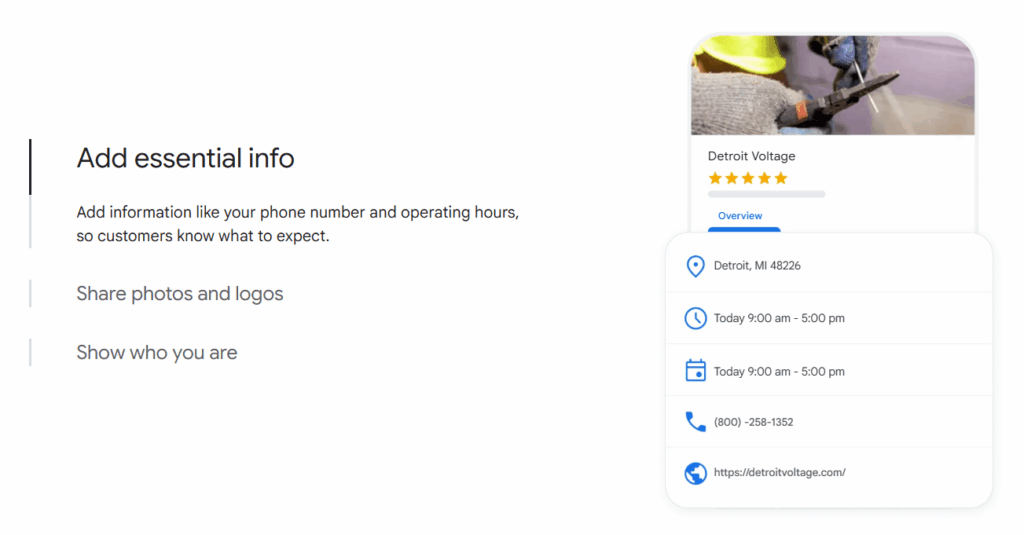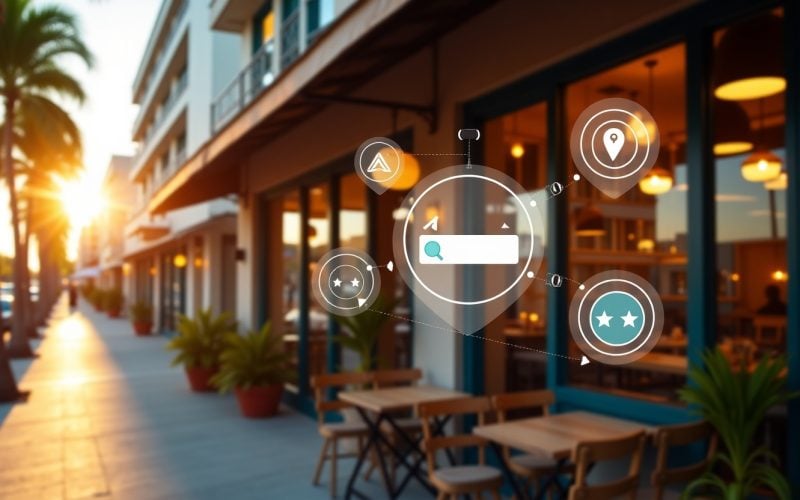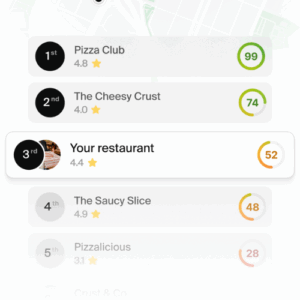Local SEO: How to Optimize Content to Rank in AI Search Results
When a potential customer asks an AI assistant like ChatGPT, Bing Copilot, or Google Gemini “What’s the best coffee shop near me?”—how does that AI decide which businesses to recommend?
It’s not based on the old rules of SEO alone.
AI search is ushering in a new era of discovery, where natural language understanding, context, and local relevance carry more weight than keywords alone. For restaurants, bars, and retail shops, adapting to this shift isn’t optional—it’s essential. In this guide, we’ll walk you through how to optimize your content to rank in AI-generated search results, with a focus on local visibility and long-term performance.

Why AI Search Is Different from Traditional SEO
Traditional search engines have long relied on keyword matches, link-building, and on-page optimization to rank results. In contrast, AI-powered search is driven by conversational queries and user intent. These systems are designed to simulate human reasoning and recommendation patterns, pulling together context from across the web to provide a single, cohesive answer.
When someone searches “best late-night tacos near Wynwood,” the AI evaluates more than just keywords. It infers context (late night, casual dining, artsy neighborhood) and prioritizes businesses that match that experience. It may reference Google reviews, menus, structured data, blog posts, and even Reddit threads to craft its answer.
In other words, AI is not indexing web pages—it’s summarizing and recommending based on what it believes to be true and relevant.
Get Your Local Data House in Order
To be recommended by an AI assistant, your business must be visible, consistent, and verifiable across structured platforms. The most influential of these is your Google Business Profile (GBP). Ensure your profile includes accurate hours, categories, services, attributes (e.g., “outdoor seating,” “family-friendly”), and updated photos.
Directory consistency is equally important. If your business information differs across Yelp, Apple Maps, TripAdvisor, or Facebook, you reduce the AI’s confidence in your legitimacy. These inconsistencies can prevent you from being surfaced in natural-language results.
Also, keep in mind that platforms like Bing and ChatGPT often use third-party sources like Foursquare, OpenTable, or Trustpilot. Make sure your listings there are also optimized.

Write for Questions, Not Just Keywords
One of the most important shifts is optimizing for how people speak, not how they type. AI searches typically begin with a question: “Where can I find a vegan lunch near Brickell?” or “Is there a rooftop bar in Downtown Miami with happy hour?”
Your content should anticipate and answer these questions directly. That means creating landing pages, blog posts, or FAQ sections that mirror conversational intent. A good example might be a page titled “Best Vegan Lunch Options Near Brickell” with natural language that responds to dining habits, dietary restrictions, and ambiance.
This doesn’t replace traditional SEO—it complements it. You’re still including core phrases like “vegan restaurant Brickell,” but within the frame of a helpful, human-oriented answer.
Make Your Content Local and Context-Rich
AI systems don’t just care that you’re a restaurant—they care what kind of restaurant you are, who you serve, and where you fit in the local landscape. Content that showcases your business’s personality, environment, and neighborhood involvement carries more weight.
This could include blog posts about seasonal menu changes, local festivals you participate in, guides like “Where to Eat Before a Show at the Adrienne Arsht Center,” or customer stories that reflect real-life experiences.
Context is also about proximity and use case. Mention nearby landmarks, parking availability, or partner businesses. AI often pulls this context into responses when a user adds location or time-specific elements to their question.
Use Reviews to Feed the AI
Reviews do more than affect reputation—they train models. AI tools use customer reviews to learn what people love (or dislike) about your business. These texts become inputs into the model’s understanding of what your brand offers.
Encourage detailed, descriptive reviews that mention what was ordered, what made the experience memorable, and what sets your business apart. For example:
“Came in for brunch after walking around Bayside Marketplace. The Cuban sandwich was legit and the servers made us feel right at home.”
Reviews like this offer rich, local language that AI systems latch onto. The more of them you have, the more reference points models have to understand what your business offers and who it serves.
And don’t forget to reply. Your responses add more context and reinforce credibility. Even short thank-you messages help build a digital persona that AI can identify as helpful and trustworthy.
Structure Your Website for AI Readability
To be properly understood by AI tools, your website should be:
- Mobile-optimized and fast-loading
- Organized with clear headings and descriptive subheadings
- Tagged with structured data like
LocalBusiness,Menu,OpeningHours, andReviewschema
If your business operates in multiple Miami neighborhoods, each location should have its own page with relevant, unique content. Add directions, hours, parking info, and even a short paragraph about the local feel or clientele. These small details can help AI match your content to location-sensitive questions.
Be Present Beyond Your Website
AI pulls information from across the internet. That includes not only your website and GBP listing, but also forums, Q&A platforms, social media, and third-party review sites.
Establishing a presence in these spaces helps AI build a more complete picture of your relevance. Participate in discussions about Miami food, nightlife, or retail on Reddit, Quora, or local Facebook groups. Write blog posts or short answers to questions people might ask, like:
- “Where to go for a first date in Coconut Grove?”
- “Best group brunch spots near Lincoln Road?”
Each of these moments creates a new reference point that AI may use when building its answers.

How AI Tools Decide What to Recommend
Here’s how some leading AI tools evaluate local business content:
ChatGPT & Gemini rely on general web knowledge and past training data. They may pull from structured business profiles, news articles, blog content, or frequently referenced sources like TripAdvisor.
Bing Copilot works directly with live Bing search results. It tends to favor well-optimized pages with schema markup, up-to-date Google listings, and strong review signals.
Perplexity.ai uses live citation-based search and favors content with clear structure, source attribution, and readability.
The more helpful, credible, and well-distributed your content is across these channels, the more likely you are to appear in AI answers.

Add an AI-Friendly FAQ Section
Adding a short, clearly written FAQ block can help AI understand and reuse your content effectively.
Frequently Asked Questions:
Q: How can I show up in ChatGPT’s local restaurant recommendations?
A: Keep your business information consistent across platforms, create useful content about your area, and maintain a strong, recent presence in customer reviews and responses.
Q: Is it different to optimize for Bing Copilot than Google Search?
A: Yes. Bing Copilot pulls from real-time Bing index results, so structured data and live, optimized pages carry more weight than historic page rank alone.
Q: What’s the best content format to feed AI tools?
A: Natural, question-based content with clear local intent—especially in blog posts, FAQs, and descriptive landing pages—tends to perform well.
Final Thoughts
AI-powered search is changing how people find local businesses. Instead of a list of links, people now receive direct, confident answers—and those answers are shaped by the content you’ve published.
To stand out in this new landscape, you must do more than use the right keywords. You need to provide context, show up consistently across platforms, answer real questions, and demonstrate a clear connection to your local community.
The more your business behaves like a helpful, trusted expert in your category, the more likely it is to be recommended by AI. That’s the next frontier of local SEO—and it starts now.. It’s the next chapter, and those who understand how to speak to AI will be the first ones it recommends.


